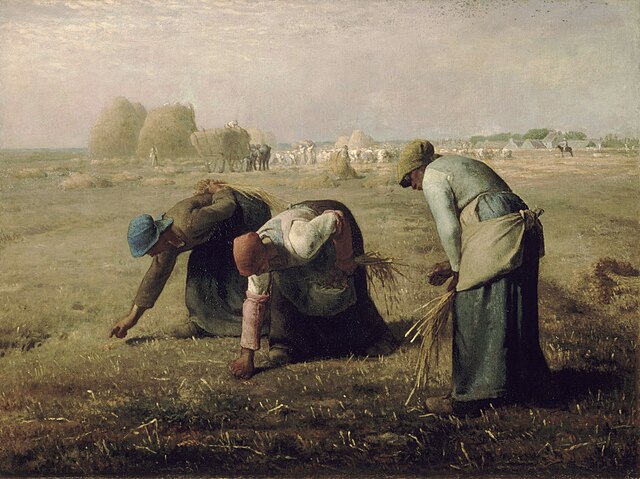Soul Work, or the Metaphysics of Care
Soul Work, or the Metaphysics of Care

"Work" now means primarily "action, labour, activity" or "an instance of this." (OED) It has a cousin in the German word Werk, which derives from a base that is cognate with the ancient Greek ἔργον (ergon), "a piece of work." You can also find that ancient Greek stem in our word energy.
But in Greek philosophy, specifically in Plato and Aristotle, ergon often has a more specific meaning which is tricky to translate into English. Here is Socrates using the word near the end of book I of Plato's Politeia (or "Republic"):
Do you think there is an ergon of horse? … [and] would you say that this is the ergon of a horse or of anything else, whatever someone can do either by means of that thing alone or can only do best with that thing? (352d–e)
Socrates gives several examples: Seeing is the ergon of eyes, hearing of ears, and so on. In such contexts, ergon is sometimes translated "function", but functions can be assigned or altered, whereas Socrates means something more like what a thing does because of what it is.
What Socrates means by ergon is closely related to the idea of "nature"—or physis in Greek. Physis is formed from the Greek verb that means "to grow". But what does it mean, fundamentally, "to grow"? The OED gives some help, defining vegetative growth as "undergoing the process of development characteristic of living plants" (s.v. “grow”).
"Development" is another word rich in etymological significance. Its original meaning is an "unwrapping" or "unfolding." A thing's growth—i.e., the process by which it manifests its nature—is a progressive "unfolding" of the distinctive power which was always latently present—or present merely as possibility, but not yet actual—not yet realized in action, not yet expressing its distinctive ergon.
A good way of understanding the entire purpose of Plato's Politeia (or “Republic”) is to see it as an extended attempt to trace this process of growth—from the presence of mere latent capacity to the full actualization of a distinctive ergon—as it applies to the human soul.
In book I, Socrates's consideration of the notion of ergon culminates with the soul. What is the distinctive "work" which can only be done or only be done best by means of a soul? What is the specific and distinctive activity that is the result of the peculiar powers of the human soul?
Socrates has at least a provisional answer, or rather a pointed question:
Then next consider this. The soul, has it a work [ergon] which you couldn't accomplish with anything else in the world, as for example, bestowing care, ruling, deliberating, and the like, is there anything else than soul to which you could rightly assign these and say that they were its peculiar work?
Bestowing care. Ruling. Deliberating. It is possible that Socrates wants us to understand "ruling" and "deliberating" as ingredients that produce "bestowing care" or "taking care of" a thing—the preeminent and specially distinctive work of a soul. And surely this work—the work of caring for something, or for someone—deserves our close consideration. Why does caring exist? What is its origin? Why are things and persons in need of care and what precisely among the vast multitude of existing things, or beyond them, is the ultimate origin and abiding principle of care? Is the universe and all it contains the product of such care? If it is not, then whence has come the "work" of caring?
Geoffrey Steadman has been carefully at work for many years on a series of commentaries on various Greek and Latin texts. You can enjoy the fruits of his labors here: https://geoffreysteadman.com/. Each commentary contains the Greek or Latin text, furnished with vocabulary glosses and notes, in a format designed to help those reading Greek or Latin literature for the first time. It is a noble work, which Steadman, out of extraordinary generosity, shares with the world, for free! All of the texts can be downloaded free of charge. Printed copies can be purchased for a modest fee. Steadman’s latest work is an edition of the book of Genesis with the Latin Vulgate and Greek Septuagint text on facing pages.
Inspired in part by Steadman’s work, I have been working on such an edition of the first four books of Augustine’s Confessions. Joshua Calvin Shaw, who has undertaken a similar series of books, is my collaborator. We are putting the finishing touches on the work now, which should appear next year from Catholic University of America Press.
My friend and colleague Chris Shannon wrote an insightful review of a new book about Catholic philosopher Étienne Gilson by Florian Michel. Chris finds in Michel’s biography an example of how historical study can enrich philosophical speculation; that, in Gilson’s own words, “the history of philosophy is not closed” but rather “a narrative of so many adventures faced by thought” that “invites us to new ones.” In following such adventures faced by thought, we become better equipped to speak to the special concerns of our own time.
Christendom College, where I have taught for twelve years, has a new president. You can read Dr. George Harne’s inaugural remarks in the college’s publication Principles.